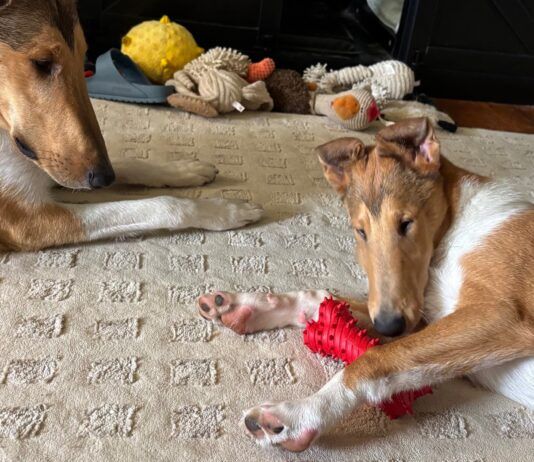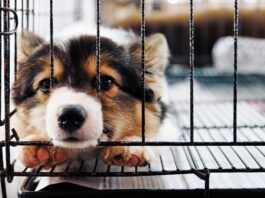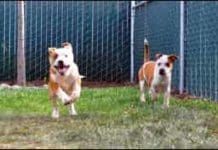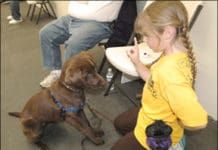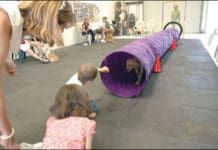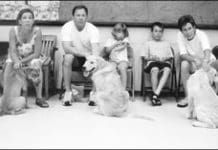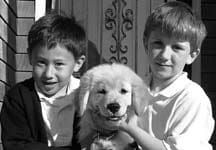Properly Socializing Your Puppy
While curiosity and the ability to learn don't have expiration dates, young puppies have an important behavioral sweet spot" between the ages of 8 and 16 weeks. During this critical period
Optimizing Your Puppy’s Brain
Cute is not the first word you reach for when describing newborn puppies. Born unable to hear or see, with smushed-in faces and twitchy little bodies, they look for all the world like diminutive aliens. Detached and distant visitors from another planet, they are in their own orbit, seeking only warmth, milk, and the rough caress of their mother’s tongue. Nothing, of course, could be further from the truth.
Puppy Vaccinations and Socialization
A veterinarian's first priority is the physical health of her clients. As a result, sadly, some veterinarians still issue the out-of-date edict to their puppy owners to not take their baby dog anywhere until he is fully vaccinated age 4 to 6 months. This, of course, totally overlooks the very real concern for a pup's mental health, and the vital need for proper socialization to occur well before the pup is fully vaccinated. As mentioned in the accompanying article, the primary socialization period is early and short when the pup is 3 to 14 weeks of age.
Eliminating Your Puppy’s Fear-Related Behaviors
The intent of puppy socialization is to convince the part of the puppy’s brain that reacts emotionally to his world (the amygdala) that, in general, the best/most appropriate emotional responses are calm, relaxed, and happy. These days, the importance of puppy socialization is well-known and widely accepted. Interesting, then, that some behavior professionals (myself included) report seeing an increasing number of canine clients with fear-related behaviors.
How an Intense Behavior Modification Program Saved One Puppy’s Life
Squid almost didn’t make it to the dog adoption option at the Humane Society of Washington County (HSWC), Maryland. Whole Dog Journal readers who have been with us for a year or more already know part of his story: the eight-week-old Jack Russell Terrier mix was surrendered to our full-service shelter by his owners because they “didn’t have time for him.” What that really meant was that the small white-and-tan pup was a heckuva handful: they couldn’t deal with his incredibly high energy level, fierce puppy play-biting, low tolerance for frustration, lack of impulse control, resource guarding, and sudden, intense aggression when restrained. He easily failed his canine behavior assessment. It’s a good thing he was impossibly cute! We started by identifying all Squid’s inappropriate behaviors and creating a modification plan for each. Some of the pieces overlapped, so it wasn’t quite as daunting as it might appear – but it was still plenty to work on!
How to Train Your Puppy Not to Bite
Contained in every puppy’s mouth is a set of amazingly sharp little daggers known as “teeth.” Puppies explore the world with those mouths. Since you are part of your pup’s world, it is inevitable that those sharp little teeth will at some point come in contact with your tender skin during a behavior known as “puppy biting.” It hurts. So what should you do when your puppy bites you, or other family members (including children)?
Dog Ovariectomy: A Safer Way to Spay Your Puppy?
Making a fresh look at the things we take for granted can be wonderfully enlightening. Sometimes, the little light bulb overhead begins to sizzle and sparkle, illuminating a new and better way of doing things. Consider this example: When some savvy veterinarians took a fresh look at performing spays, a surgery we've been doing the exact same way for decades, they came up with a revised technique that accomplishes all of the objectives of the spay surgery with fewer complications. How cool is that?
Getting the Most Out of Puppy Kindergarten
You've got a new puppy and are about to start puppy classes (or are planning ahead for your new pup even better!). You know good puppy classes are an integral part of helping you and your dog invest in a long and harmonious future. Puppy classes aren't magic. Just signing up, paying, and attending aren't enough. You have to train and practice and build your relationship with your puppy. It will last a lifetime and the effort you put in now will pay off multifold. But keep in mind that the bad habits that you and your puppy develop now will also give you payback many times over! So let's assume you have really committed yourself to rearing a puppy well, and talk about how to get the most out of your puppy classes
Problems With Adopting Two Puppies Simultaneously
There's no denying it: a new puppy is one of the world's most wonderful things. It's a cold, hard heart that doesn't get all mushy over puppy breath, soft pink puppy pads, and the fun of helping a baby dog discover his new world. So, if one puppy is wonderful, two puppies must be twice as wonderful, right? Well, not usually. Most training professionals strongly recommend against adopting two pups at the same time. The biggest challenge of adopting puppy pairs is their tendency to bond very closely with each other, often to the exclusion of a meaningful relationship with their humans. They can become inseparable. Also, owners often underestimate the time commitment required to properly care for and train two puppies; as a result the pups often end up untrained and undersocialized.
Conditioning Confidence in Your Dog or Puppy
There was once a time when you rarely encountered the word socialization" in dog circles. Today it's the new training buzzword; if you haven't heard it at least three dozen times by the time your dog is a dozen weeks old
Get Your Puppy Enrolled Into Puppy Training School As Early as Possible
The optimum time to start a puppy’s education is as early as possible: about eight weeks of age. With food treats and clickers as the primary tools in our training arsenal, we can help owners start educating their youngsters at an optimum training age, before pups have had several months of reinforcement for unwelcome and inappropriate behaviors. Paradoxically, some veterinarians still counsel owners to wait until their new puppies are six months old and “fully vaccinated” to take them to training class. Unfortunately, this advice is just as outdated as the use of choke chains in puppy classes! It’s true that you shouldn’t wantonly expose your pup to high-risk dog populations; you should never take him to a dog park, or let him play with stray dogs on the street. But the risk of contracting an infectious disease in a controlled setting, with other healthy puppies, is quite low.
Holistic Puppy Care Starts With The Parents
Responsible, holistic puppy care begins long before the puppy arrives at the homestead. In fact, the first step to creating a healthy puppy is the selection of the puppy’s parents! The best predictors of long-term health of puppies are the health history and personality of the parents. Breeding stock should be proven to be sound in body, mind, and socialization.


